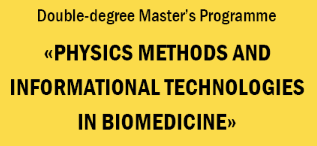 |
Abstract programme.The double-degree Master’s programme «Physics methods and technologies in biomedicine» is worth a total of 120 ECTS (EU). The programme is designed by the Faculty of Physics at Tomsk State University, the Russian Federation, jointly with the Faculty of Health, Medicine and Life Science of Maastricht University, the Netherlands. |
Introduction
In the last decade, the life sciences have become a crossroads of disciplines where scientific and technological developments, with a great impact on industry, science and society, come to flourish.
A characteristic feature of modern medicine, which includes prevention, diagnostics and treatment, is the extensive application of methods derived from the field of physics and information technologies. Sophisticated electronic equipment is becoming widely used in medicine; for example, various types of scanners, imagers, encephalography machines, lasers, X-ray machines and a large class of accelerators. Furthermore, modern information technology is also being introduced into medical practice. Against this background, healthcare and medical research institutions are in need of specialists with fundamental training in physics and mathematics, electronics and computer science, and a comprehensive understanding of medical issues and challenges.
Find more programme information.
Objectives
The Master’s programme aims to train highly qualified personnel in medical physics. The programme will enable them to apply their knowledge of physics principles, methods and molecular mechanisms and use state-of-the-art techniques and supercomputing technologies in medical research for the purpose of understanding and unraveling the mechanisms that underlie health and disease.
The Tomsk campus currently offers one specialisation.
Medical Physics.
These specialisations are chosen in the second year of the programme. Students choose specializations taking account of the location of the lab where the senior practical training they aim for is performed.
A unique characteristic of this programme is the integration of courses and practical internships in molecular medical and biomedical research at UM and TSU, and the numerous opportunities for students to participate in ongoing first-rate research.
Programme outcomes
At the end of the respective course of study, the graduates should able to:
§ integrate interdisciplinary knowledge of biomedicine, physics, mathematics, biology;
§ use and operate modern medical equipment;
§ use the methods of medical imaging for assessment of public health;
§ use high parallel computing for solving medical imaging tasks and three-dimensional reconstruction;
§ analyze medical information based on theoretical knowledge of physics principles and laws;
§ receive and process big-data for the assessment of biosystems;
§ perform calculations based on the results of experiments, carrying-out mathematical and statistical processing of multidimensional biomedical data;
§ integrate scientific knowledge and skills for evidence-based practice in diagnostics.
Job prospects
The knowledge acquired by our graduates on physics methods and high-performance and supercomputing technologies in medical research and practice will prepare them for challenges of scientific and practical work aiming at improvement of the quality of medical care and ensuring efficient use of health care resources. Upon completion of the programme, graduates are prepared to join medical, biological and health care research centres working towards solving complex scientific tasks like the diagnosis, treatment, rehabilitation and prevention of diseases. They may also choose to explore job opportunities in software development for practical and theoretical needs in biomedicine.
Programme facts
- Degree/title: MSc Physics /MSc Biomedical Sciences
- Language: English
- Part- or full-time status: Full-time Study
- Start of studies: 2015/2016
- Entry requirements: The presence of bachelor’s or a specialist’s (diploma) degree in Physics, Biology, Medicine or Computer Sciences; English-language skills
- Admission tests: physics (exam) and interview on the subject of the educational program.


